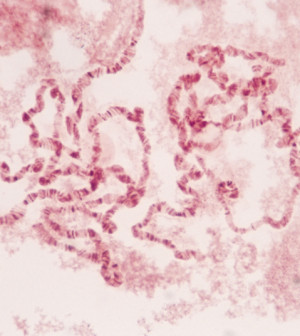- Could Your Grocery Store Meat Be Causing Recurring UTIs?
- Are You Making This Expensive Thermostat Error This Winter?
- Recognizing the Signs of Hypothyroidism
- 10 Strategies to Overcome Insomnia
- Could Artificial Sweeteners Be Aging the Brain Faster?
- Techniques for Soothing Your Nervous System
- Does the Water in Your House Smell Funny? Here’s Why
- Can a Daily Dose of Apple Cider Vinegar Actually Aid Weight Loss?
- 6 Health Beverages That Can Actually Spike Your Blood Sugar
- Treatment Options for Social Anxiety Disorder
Study Yields Genetic Insights Into Pancreatic Cancer


Most pancreatic cancers have gene mutations that could be targeted by existing drugs, a new study suggests.
The researchers say the findings could lead to improved treatment for pancreatic cancer, the fourth leading cause of cancer death in the United States.
“We identified a wealth of genetic diversity, including multiple mutated genes that were previously unknown to pancreatic cancer — an important step in gaining a better understanding of this difficult and particularly deadly disease,” said study author Dr. Agnieszka Witkiewicz, an associate professor of pathology and a member of the cancer center at UT Southwestern Medical Center in Dallas.
“Importantly, the team was able to identify several genes that may be able to help us to predict outcomes in certain circumstances or serve as good candidates for therapeutic efforts,” Witkiewicz said in a medical center news release.
The researchers analyzed the DNA of 109 pancreatic tumors and discovered that each patient’s tumor was unique, according to the findings published April 9 in the journal Nature Communications.
“While we suspect that genetics can be used as the basis of targeted treatments, this point will only be proven through extensive research and clinical studies, hopefully leading to improved outcomes for patients,” study senior author Dr. Erik Knudsen, a professor of pathology and a member of the cancer center, said in the news release.
“I am considerably more optimistic of the utility of a genetically targeted therapy for pancreatic cancer today than when we began this work,” he added.
Pancreatic cancer is difficult to treat and new therapies are urgently needed, experts say.
“Pancreatic cancer will surpass breast and prostate to become the third-leading cause of cancer-related deaths in the next 15 years. If we want to change the death rate, we need to increase the investment in understanding the biology of pancreatic cancer and identifying novel treatment strategies,” study co-author and pancreatic cancer surgeon Dr. Michael Choti said in the news release.
More information
The American Cancer Society has more about pancreatic cancer.
Source: HealthDay
Copyright © 2026 HealthDay. All rights reserved.










